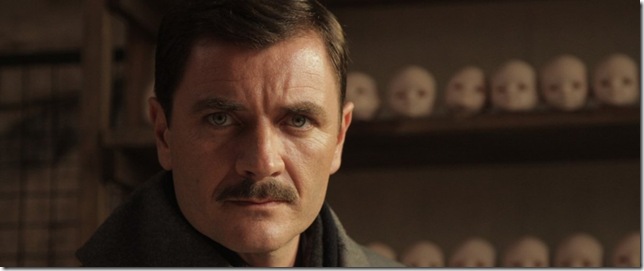A family of five travels down a single dirt road, endless desert on either side, toward a destination they must reach before dark. They don’t quite make it, a torrential storm batters their car, and they’re being followed by a mysterious stranger whose intentions are unknown to them. Both cars stop for a shelter at a remote shack, where raw meat hangs on hooks.
If that doesn’t sound like a scene out of a ’70s slasher flick, I don’t know what does. And in a sense, The German Doctor is a horror film, albeit a cerebral, meticulously photographed art-house sort of chiller that takes its time. The man traveling solo is in fact a figure worse than most villains spawned from the imagination of Wes Craven or John Carpenter: It’s Josef Mengele, one of Hitler’s top SS officers, who was known as the Angel of Death for his chief role in sentencing victims to gas chambers. The movie is set in 1960 in Argentina, one of the many countries in which Mengele found asylum, evading capture through an underground network of sympathizers all the way until his death, in Brazil, in 1979.
In the opening minutes of The German Doctor, Mengele finds his safe haven: the family he follows and befriends, who happen to be inheriting a stately hotel from a deceased relative; this allows Mengele lodging and, most importantly for him, the opportunity to perform experiments on the family’s growth-stunted child, Lillith (Florencia Bado), in his ongoing efforts to create the “perfect” human form.
Writer-director Lucia Puenzo adapted the movie from her own novel. She took liberties with the source material, but if the names and specific situations have changed, one assumes that the Argentine family is a composite: Mengele was doing these sick things until he finally met his maker, and he did them all with the complicity of his host countries. When The German Doctor is not unsettling, it’s infuriating, rarely providing much respite from either of these blood-pressure-raising tones.
It’s also literary, betraying its novelistic origins, particularly in the pointed contrast between Mengele, with his eugenic ideology of bodily “improvement” through hormone therapy, and Lillith’s father Enzo (Diego Peretti), an aspiring inventor of mechanical dolls who prides his creations on each one’s individual imperfections. Cliff’s Notes-ready symbolism and analogies abound from this dichotomy, some of them too on-the-nose: In the family’s first encounter with Mengele, the Nazi retrieves a homemade doll Lillith dropped from her car seat and opens its empty abdomen; “the heart goes there,” Lillith says.
But the movie achieves something the book couldn’t: emotional manipulation through casting. And Àlex Brendemühl’s extraordinary performance as Mengele anchors the film from his first moment onscreen. He carries himself with equal parts of a star’s magnetism, a pedophile’s lecherousness, and a philanthropist’s beneficence; it’s through Mengele’s shadowy income, after all, that Enzo is able to manufacture his dolls wholesale.
Brendemühl doesn’t look like a monster; in fact, he looks a bit like Joaquin Phoenix’s frumpy protagonist in Her. The film is only believable because we believe him, and can see his charm as well as his psychopathy. It’s also why, with another World War II-themed movie seeming to open every other week, this one will remain hard to forget.
THE GERMAN DOCTOR. Director: Lucia Puenzo; Cast: Àlex Brendemühl, Florencia Bado, Natalia Oreiro, Diego Peretti; Distributor: Samuel Goldwyn Films; Rating: PG-13; in Spanish, German and Hebrew. Opens: Friday at Movies of Lake Worth, Movies of Delray, Delray Marketplace Stadium 12, Regal Shadowood 16 and Living Room Theaters in Boca Raton, The Classic Gateway Theater in Fort Lauderdale, AMC Aventura 24, Regal South Beach 18, and the Tower Theater in Miami.
